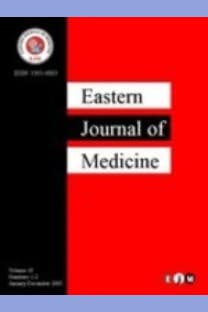Evaluation of Cardiopulmonary Resuscitation (CPR) Practice of Nurses at a Tertiary Hospital
___
1.Cooper S, Cade J. Predicting survival, inhospital cardiac arrests: resuscitation survival variables and training effectiveness. Resuscitation 1997; 35: 17-22.2. Berg RA, Hemphill R, Abella BS, et al. Part 5: adult basic life support: 2010 American Heart Association Guidelines for Cardiopulmonary Resuscitation and Emergency Cardiovascular Care. Circulation 2010; 122: 685-705.
3. Highlights of the 2018 Focused Updates to the American Heart Association Guidelines for CPR and ECC: Advanced Cardiovascular Life Support and Pediatric Advanced Life Support. Available from: https://eccguidelines.heart.org/wpcontent/uploads/2018/10/2018-FocusedUpdates_Highlights.pdf
4. Pareek M, Parmar V, Badheka J, Lodh N. Study of the impact of training of registered nurses in cardiopulmonary resuscitation in a tertiary care centre on patient mortality. Indian J Anaesth 2018; 62: 381-384.
5. Castillo J, Gallart A, Rodriguez E, Castillo J, Gomar C. Basic life support and external defibrillation competences after instruction and at 6months comparing face-to-face and blended training. Randomised trial. Nurse Educ Today 2018; 65: 232-238.
6. Rajeswaran L, Cox M, Moeng S, Tsima BM. Assessment of nurses' cardiopulmonary resuscitation knowledge and skills within three district hospitals in Botswana. Afr J Prim Health Care Fam Med 2018; 10: 1-6.
7. Brião RdC, Souza ENd, Castro RAd, Rabelo ER. Cohort study to evaluate nursing team performance in a theoretical test after training in cardiopulmonary arrest. Rev Lat Am Enfermagem 2009; 17: 40-45.
8. Kara F, Yurdakul A, Erdoğan B, Polat E. Bir Devlet Hastanesinde Görev Yapan Hemşirelerin Güncel Temel Yaşam Desteği Bilgilerinin Değerlendirilmesi. Mehmet Akif Ersoy Universitesi Sağlık Bilimleri Enstititüsü Dergisi 2015; 3: 17-26.
9. Bukiran A, Erdur B, Ozen M, Bozkurt AI. Retention of nurses' knowledge after basic life support and advanced cardiac life support training at immediate, 6-month, and 12-month post-training intervals: a longitudinal study of nurses in Turkey. J Emerg Nurs 2014; 40: 146- 152.
10. O'Steen DS, Kee CC, Minick MP. The retention of advanced cardiac life support knowledge among registered nurses. J Nurs Staff Dev 1996; 12: 66-72.
11. Smith KK, Gilcreast D, Pierce K. Evaluation of staff's retention of ACLS and BLS skills. Resuscitation 2008; 78: 59-65.
12. Heard DG, Andresen KH, Guthmiller KM, et al. Hands-Only Cardiopulmonary Resuscitation Education: A Comparison of On-Screen With Compression Feedback, Classroom, and Video Education. Ann Emerg Med 2018; S0196-0644(18)31286-31281.
13. Anderson R, Sebaldt A, Lin Y, Cheng A. Optimal training frequency for acquisition and retention of high-quality CPR skills: A randomized trial. Resuscitation 2018; S0300- 9572(18)31068-31062.
14. Ersoy G SS, Gedik H, Yenal S, Üstünkarlı N, Tırpan K, Türkmen S. Paramedik öğrencilerinin CPR (kardiyopulmoner resusitasyon) bilgi düzeylerinin ve bunu etkileyen faktörlerin incelenmesi. Acil Tıp Dergisi 2003; 1: 27-32.
- ISSN: 1301-0883
- Başlangıç: 1996
- Yayıncı: ERBİL KARAMAN
MEHMET HAMDİ ŞAHAN, MİKAİL İNAL, NEŞE ASAL, NESRİN BÜYÜKTORTOP GÖKÇINAR
Hook Plate Applications in Type 3 Acromioclavicular Dislocations
Socio-Demographic Determinants of Dental Anxiety and Fear Among College Students
Esin ÖZLEK, ABDULLAH YILDIRIM, Alaettin KOÇ, MURAT BOYSAN
Why Do Nursing and Midwifery Students Choose Their Profession in Turkey?
ŞÜKRİYE İLKAY GÜNER, Selver KARAASLAN, Reyhan ORHUN
Sema YÜKSEKDAĞ, Ahmet TOPÇU, İldem DEVECİ, Ethem ÜNAL
Musculoskeletal Health Committee Report on Evaluation of Musculosketeal Disability in Van
Evaluation of Cardiopulmonary Resuscitation (CPR) Practice of Nurses at a Tertiary Hospital
GÖKHAN GÖRGİŞEN, TAHİR ÇAKIR, CAN ATEŞ, İsmail Musab GÜLAÇAR, Zafer YAREN
Therapeutic Curettage On Follow Up Human Chorionic Gonadotropin Levels in Ectopic Pregnancy
Melih BESTEL, ONUR KARAASLAN, Ayşegül BESTEL, Süleyman SALMAN
